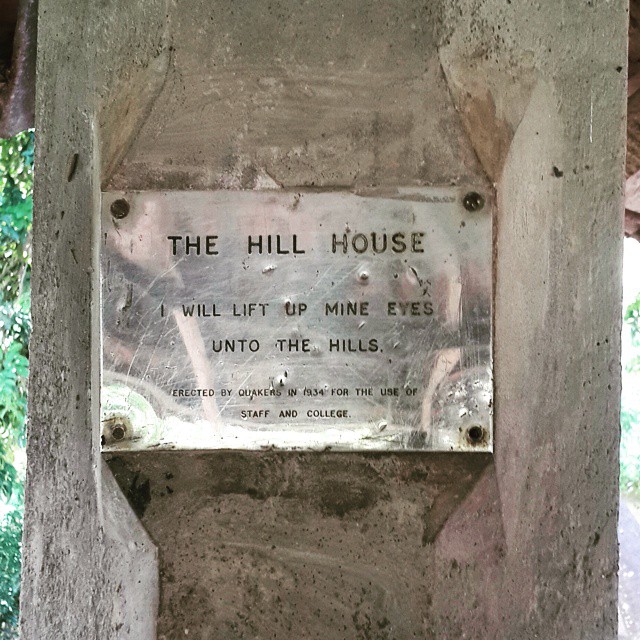
The Hill House Meeting originates from a group of British Quakers recruited as staff for Achimota College and School from 1925 who established a meeting for themselves and for other members of staff. In 1934, they built the Hill House Meeting garden shelter on the school property.
Due to career changes and postings, the Meeting remained small between 1925 and the early 1940’s, with a predominantly expatriate membership and a few Ghanaians. Meetings lapsed in the mid-40’s before a flurry of activity from 1947 – 1948, lead by Mrs. Iona Acquah. By 1953, there was a real revival, led by the Acquahs, and sustained by staff of the University. From then onwards, the meeting has continued.
Meetings for worship were initially advertised in the national papers and this attracted a few Ghanaians and expatriates, increasing the number of attendees although membership has always remained relatively small.
By the 1970′s, there were three meetings in Ghana – Accra, Cape Coast and Kumasi. At the time, Hill House had three meetings for very young children, adolescents and adults simultaneously. Easter Gatherings started 1974 and have continued to date. Moreover members of the Meeting (and the Meeting as a collective whole) played active roles in social causes in Ghana and in the Christian Council, making the existence of the Quakers well-known.
The Easter Gathering
By 1954, Friends had identified their need for a gathering of all Friends resident in Ghana, as well as any who are working in neighbouring countries and might wish to share a fellowship. With their Ghanaian counterparts, the first Easter Gathering of Friends came off that year and has become an annual event.
Christian Council Membership
In the mid 1960s, Friends in Ghana became anxious to relate even more closely to the Christian Community in Ghana. Accordingly, it sought and was admitted into the Membership of the Christian Council of Ghana as a constituent member.
Social Work
In line with the tradition of Friends, Quakers in Ghana, right from their very early beginnings, have sought to render social service as a testimony of their concept of work and worship being inseparable.
The Red Cross
Frank Jocelyn rendered pioneering services in the creation of Junior Red Cross Links in Educational Institutions in the early 1930s from his base at Achimota School and College.
Liberal Studies
With the support of the Prisons Authority in the Gold Coast, Leonie Acquah promoted liberal studies, lectures and Library services in Accra and later in Sekondi.
Voluntary Work Camp Association (VOLU)
Supported by Friends in Accra, Cape Coast etc and with the considerable patronage of Francis L. Bartels (then Headmaster of the Mfantsipim School), Gordon C. and John Hall started the Voluntary Work Camp Association of Ghana (VOLU) which was formally inaugurated in 1956.
Funding for Community Development
- Corn mill for the Putubiw Development Programme, Putubiw, near Cape Coast.
- Funds for Lume Community travel to Kenya in brick and tile making project (Lume is 10 miles from Ho in the Volta Region).
- A social survey to establish some community needs in Nima was undertaken by a South African Sociologist – Ngysani under the supervision of Professor St Claire Drake, an American Visiting professor then in the Gold Coast.
Nutritional and Health Project
- The Accra schools nutritional and health project under the supervision of Adam Curle, Professor of Education at the University of Ghana and the Department of Social Welfare and Community Development and the Ministries of Health and Education. Covered selected schools in Jamestown.
- Hill House, London Yearly Meeting, Wesley Girls’ High School, Ministry of Health were involved in the Nkanful Mental Hospital Project to support the occupational therapy unit in Cape Coast.
Educational Support
- Posting of Quaker volunteers to various teaching posts in Ghana – Wesley Girls’ High School (Cape Coast), Aburi Girls’ Secondary School (Aburi), Navrongo Secondary School (Navrongo) and Ghana International School(Accra).
- Aburi Girls’ School Domestic Science project at Gyankama directed by Sarah Hall(nee Ainsworth) and financed by Hill House.
